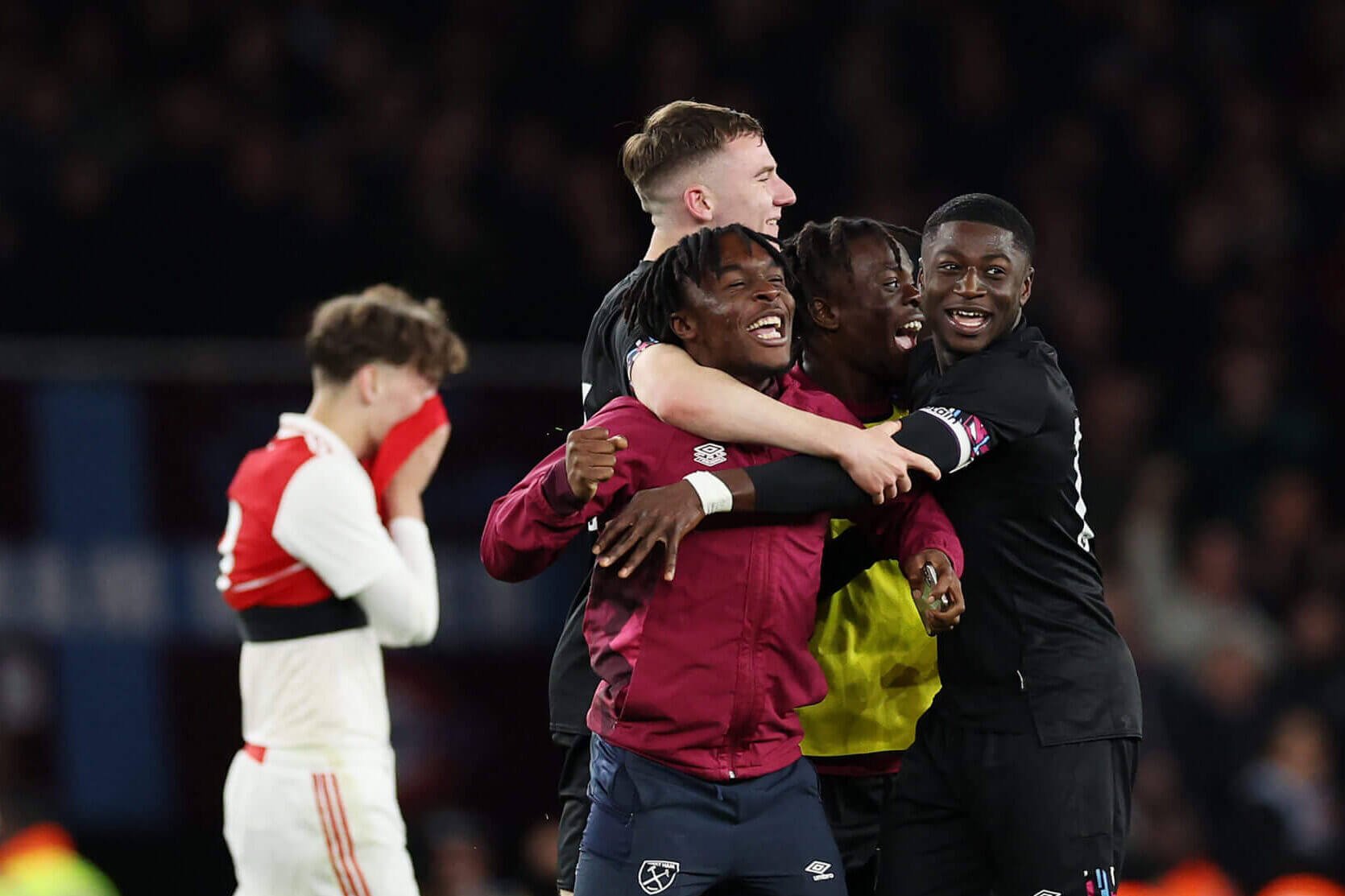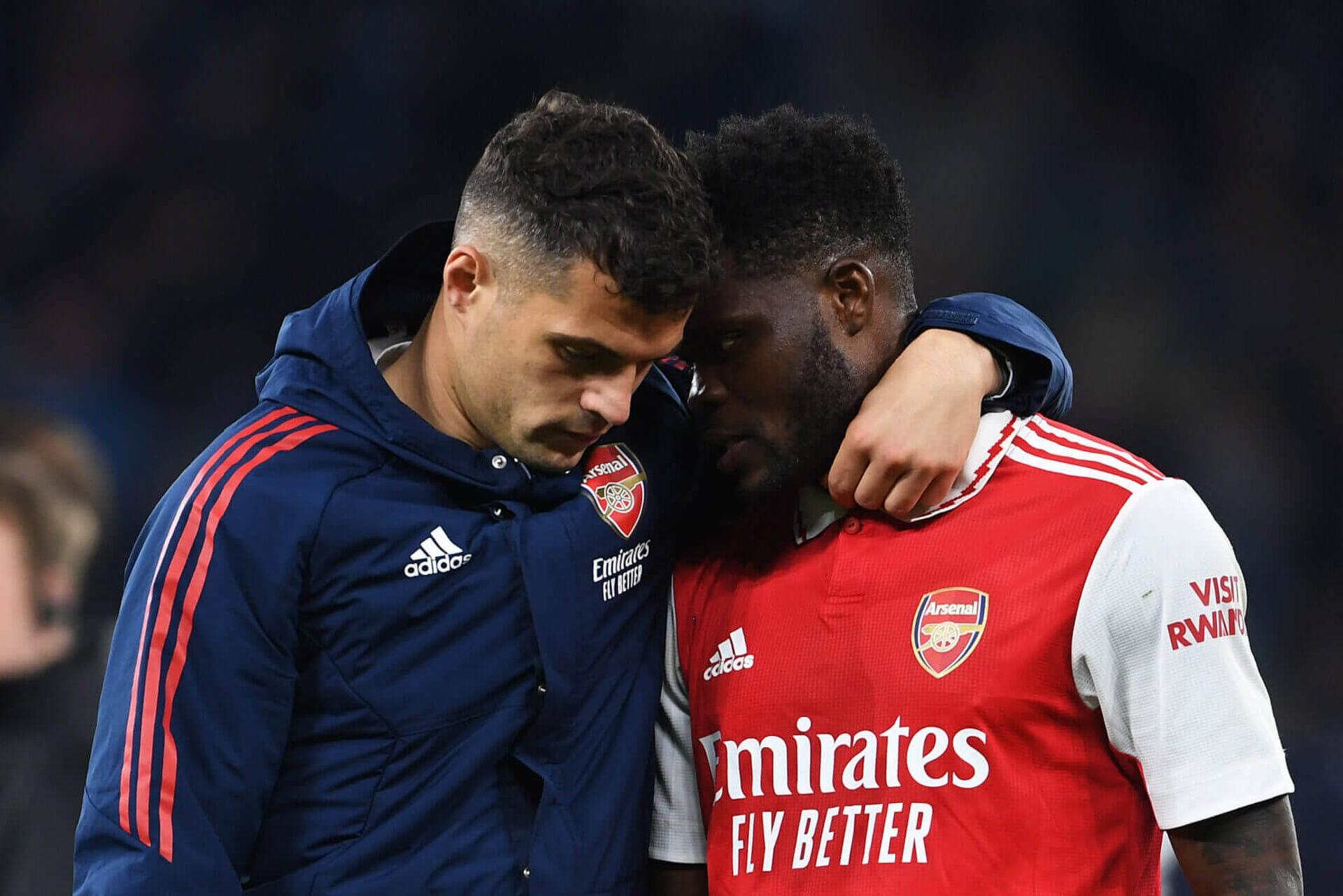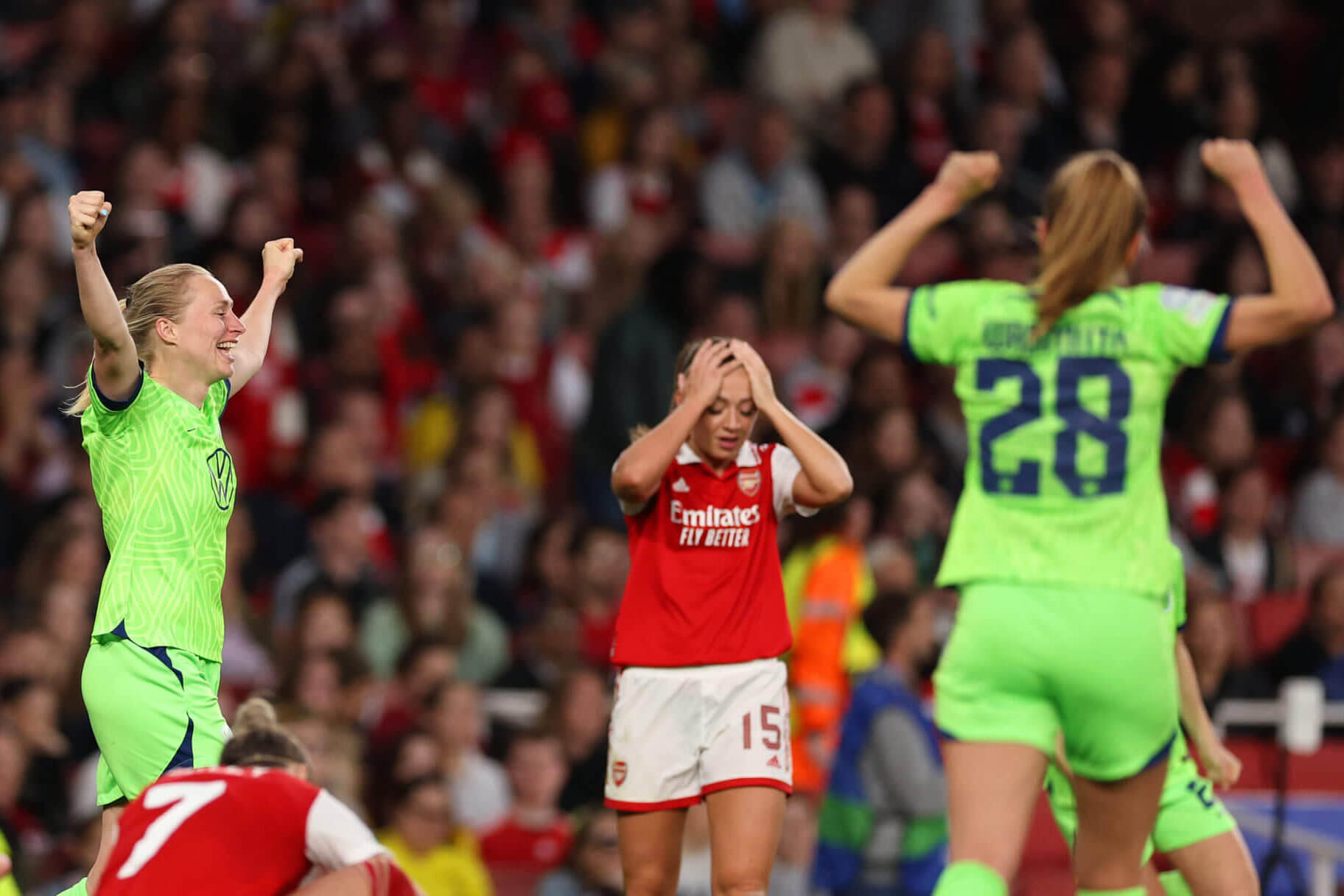Arsenal’s defining week: After so many highs, three excruciating lows
Stamfordblue 2023-05-02 21:55:50 评论
It can be cruel sometimes, football. There is a player in red and white who has pulled his shirt over his face because he is trying to hide his tears. His name is Michal Rosiak and his team is Arsenal. He looks what he is: a boy of 17, finding his way in a sport that plays with all of our emotions.

The scene is the Emirates Stadium. Arsenal have just lost the FA Youth Cup final at the start of a seven-day stretch that will go a long way to determining whether the club, as a whole, can reflect on a season with a happy ending.
A member of backroom staff intercepts defender Rosiak as he makes his way, face hidden, towards the tunnel. You cannot tell exactly what is being said, but you know the gist of it: suck it up, accept it, come back stronger… and you know, in these precise moments, that there are not really words to make it feel any better.
The following night, it is the turn of the men's first team… and another grievous setback. This time, it is in front of a worldwide television audience of millions. It is the biggest night of the 2022-23 Premier League season and, as Manchester City celebrate their victory, there is the unmistakable sense they have blown a gaping hole in Arsenal's title chances.
Ederson, City's goalkeeper, can be seen making cry-baby gestures towards the corner of the stadium where the travelling Arsenal fans are congregated. Ben White, the Arsenal defender, is having to be pulled away from City's Phil Foden. As the television cameras pan to the away end, you can see the anguish on thousands of faces.
And then, six days on from that cup final, we are back at the Emirates and, for Arsenal, another night of searing disappointment.
Arsenal are now taking on German visitors Wolfsburg for a place in the Women's Champions League final. It goes to extra time and, finally, agonisingly, the decisive moment arrives in the 119th minute. The winner is scored by a Wolfsburg player and, at the final whistle, it is another scene where it is difficult to think there are any words to console the losing players. Some are on their knees, others on their backs.
Three games, seven days. Three defeats and, for Arsenal, the worst possible outcome for all three teams. It's been… emotional.
Tuesday, April 25
Arsenal 1-5 West Ham United, FA Youth Cup final
On the walls of Arsenal's press room, there are rows and rows of framed pictures that, in their own way, tell the history of this club.
Each picture shows the newspaper coverage of Arsenal's most notable achievements. It starts with their pre-war trophies and the black-and-white images from a time when Arsenal enthusiasts got their news from the Sunday Pictorial and the rather magnificently named Illustrated Sporting and Dramatic News.
Then, decade by decade, it becomes a smorgasbord of nostalgia: Frank McLintock being carried shoulder-high with the 1971 FA Cup, Michael Thomas winning the title at Anfield, Tony Adams saluting the North Bank after a humdinger of a goal for another championship. Arms wide, chest out, happy times — the pose that was turned into a statue outside the Emirates.
Another picture shows Arsene Wenger, mid-air, being thrown into the skies by his players after Arsenal had beaten Hull City for his fifth FA Cup win. Wenger won seven in total as Arsenal manager and, to put that in context, it is one more than Manchester City have managed throughout their entire existence.
It was the same number, at the time of Wenger's retirement, that Liverpool had won in their entire history. Chelsea, too. Wenger won more FA Cups than Leeds United, Nottingham Forest and West Ham altogether. It just seemed to pass him by, in his last decade with the club, how to win the league title. It is now almost 19 years since the last one and, for a club with Arsenal's ambitions, that is a lot of pent-up frustration.
It has also been a long while since Arsenal could boast they had a special relationship with the FA Youth Cup.
Their first win came in 1966 and, since then, there was at least one every decade until the run stopped in 2009, when a 17-year-old Jack Wilshere was part of their victorious team. It was the seventh time Arsenal had lifted the trophy and, at that stage, only Manchester United had won more.
But time moves on. Wilshere now coaches Arsenal's youth team, with a different set of priorities to the days when, injuries permitting, he was adding his stylish touches to Wenger's senior side. This was Arsenal's first appearance in the final since 2018 and more than 30,000 people were at the Emirates to see whether Wilshere's inaugural season with their under-18s would get a happy ending.
Unfortunately for Wilshere, Arsenal were playing a West Ham side who have been bludgeoning teams at this level all season. West Ham, managed by Kevin Keen, had run away with the Premier League under-18s' division (southern section): 18 wins from 21 games, 72 goals scored, 16 points clear.
They were 34 points ahead of second-bottom Arsenal and, with that kind of record, they were never likely to be flustered when Omari Benjamin opened the scoring after eight minutes. West Ham simply got on with the business of demonstrating they were the better team.
Two goals in as many minutes just after the quarter-hour turned the game upside-down. It was 3-1 before half-time and you know it isn't going well for Arsenal, at any level, when they decide it is time for an impromptu huddle in between opposition goals. A fourth went in from a 78th-minute corner. The fifth arrived in stoppage time.
First-team manager Mikel Arteta and his players were watching the game on TV from their hotel in Manchester.
(Photo: Richard Heathcote/Getty Images)
West Ham had 7,000 fans behind one goal and, football being the sport of schadenfreude, their chants of, “Where's your title gone?” were designed to cut deep.
There were others, too. “Are you Tottenham in disguise?”, could be heard. One Arsenal fan took offence, made a series of hand gestures and was thrown out by security.
His removal guaranteed another cheer from the away end and, when it was time to present the trophy, your eyes were drawn to the players in red and white who were loitering by the side of the pitch, close enough to the tunnel to make a hasty exit. Some of them had their backs turned. It was too painful, they did not want to look.
Wednesday, April 26
Manchester City 4-1 Arsenal, Premier League
It started around the hour mark. Arsenal's fans were spread over three tiers and, even in the most harrowing moments, they were determined to be heard. One song, over and again. “We love you Arsenal, we do …. Ohhh, Arsenal, we love you.”
It felt like an appreciation for everything their team had done this season.
Arsenal, lest it be forgotten, had finished, on average, 27.8 points behind City in each of the previous five seasons. Yet, going into this match, there had been only two occasions since the end of August that City had been above them in the league, and both times it was on goal difference. One lasted a day, the other three. Arsenal had been looking down on City, and everybody else, since February 18. In total, they had spent 245 days at the top.
“At the start of the season, the statistics said that Arsenal would finish sixth or seventh,” Mikel Arteta pointed out in his post-match interviews. “Those players deserve a lot of credit to go nine and a half months against this exceptional (City) team.”
Arteta tried his best to sound positive, because what else could he do? He said they could still win their final five games, which would take them to 90 points and equal the total of the Invincibles, the Arsenal team that went unbeaten throughout the entire 2003-04 league season. City, he argued, could still slip up. “I've been in this country almost 22 years and I've seen a lot of things.”
What he has never seen, though, is an end-of-season collapse from the team managed by Pep Guardiola. City have substance to match their skill. In the past five seasons, they have taken an average of 24.8 points from the final 30 available.
Arsenal, in contrast, almost stumbled into the Etihad on the back of a 3-3 home draw with bottom-of-the-table Southampton and successive 2-2s away to Liverpool and West Ham where they surrendered a two-goal lead on both occasions. It is the first time since Manchester United in December 1966 that the team at the top of the table have conceded two or more goals in four successive games.
As for the last side in that position to go four without a win, we have to go back to March 2008. That was Arsenal, too.
This time will hurt even more. One journalist asked Arteta if we had seen his players “freeze” and, to begin with, he had to clarify he had heard the question correctly.
“Yes… were they too scared to perform?”
(Photo: Stuart MacFarlane/Arsenal FC via Getty Images)

Arteta's response was that, no, he didn't think stage fright had anything to do with it. But perhaps it is just inevitable this is being levelled at Arsenal given they came away from the Etihad having conceded their most goals in a single calendar month since December 2018.
Arsenal had finished March with a freewheeling 4-1 win over Crystal Palace. They began April by beating Leeds by the same score. Life was good. The front cover of The Gooner fanzine showed the Premier League trophy and the words: “Gunning for Glory…?”
Just a few weeks later, it must be fairly heartbreaking for any Arsenal fan to flick through those pages again.
“As I put these thoughts together,” one contributor writes, “part of me thinks this is just a dream. I didn't believe for a second we'd be eight points clear at the top of the Premier League going into April, nobody did at the start of the season.”
In ordinary circumstances, it would be something to cherish, to celebrate. These, of course, are not ordinary circumstances.
“Champ-ee-oh-nays” sang the City fans and, for the second night in a row, Arsenal's players had to watch another team experiencing all the joys.
Monday, May 1
Arsenal 2-3 Wolfsburg (4-5 on aggregate)
Women's Champions League semi-final, second leg
It's a sunny early evening on a Bank Holiday in London and, once again, the Emirates is trying its best to be a happy place. A sell-out crowd of 60,063 is arriving under blue skies. There has never been a higher attendance for a women's club match in England. “Welcome,” says an introductory page in the matchday programme. “You are at the home of England's most successful women's football club.”
By the end of the evening, however, it is another unhappy Arsenal scene, another night of hard-luck stories and pride mingling with raw disappointment.
Arsenal were trying to reach a Champions League final next month against Barcelona. They were also having to get by with an extensive injury list and facing a Wolfsburg side who have scored 63 goals from 18 games in this season's Frauen Bundesliga. And, ultimately, it will be the German side travelling to the Dutch city of Eindhoven to face Barcelona on June 3.
It was an epic night of knockout football and, when the dust settled, Arsenal's women had something in common with the men's team: they can both take pride in getting as far as they have.
For a bit of context, when these two clubs faced one another in the Champions League semi-finals 10 years ago, the crowd for Arsenal's home leg was 1,406 and the game was played at non-League Boreham Wood's 4,500-capacity ground because there was no real appetite to stage it at the Emirates.
Plus it is worth remembering how many of Arsenal's category-A players are on their list of absentees.
Arsenal have had to get by without Vivianne Miedema, last season's top scorer, because of the knee injury that has kept her out since the end of last year. They've had to cope without Beth Mead, the 2022 Ballon d'Or runner-up, because she, too, has the injury footballers fear most: the ACL. Kim Little, their captain, has also kicked her last ball of this season, having damaged her hamstring in the quarter-final against Bayern Munich.
What is an ACL tear and how long does it take to recover?
As for Leah Williamson, their England skipper, she could be seen before kick-off pulling pints at the Tollington Arms, a nearby pub with such a strong affinity to Arsenal it even has a statue of Martin, the landlord, in recognition of his work to make it a football-friendly venue.
Williamson could drop in for a guest appearance because she, too, has a season-ending knee injury; and, as if that were not enough to contend with, Laura Wienroither's involvement in this semi-final ended with her being taken off on a stretcher.
Yet Arsenal dug in.
They got a bit lucky with an early VAR escape when Lotte Wubben-Moy batted away a cross with her hand. Stina Blackstenius gave Arsenal a 3-2 aggregate lead after 11 minutes and the first Mexican waves started to snake around the stadium just after the half-hour.
(Photo: Richard Heathcote/Getty Images)

Jill Roord, a former Arsenal player, punctured the mood with a volleyed equaliser just before half-time. Blackstenius was denied a second goal by a VAR offside decision and Wolfsburg's second arrived in the 59th minute when Alexandra Popp headed in a corner. Still, though, Arsenal came back, in the form of Jen Beattie's equaliser with a quarter of an hour of normal time to go.
Pauline Bremer's winner in the last minute of extra time was cruelly timed, and sadly fitting in the story of Arsenal's past week.
For Wubben-Moy, it was also a personal ordeal. It was her mistake to give away the ball in a dangerous area. The damage was done and a six-day stretch that began, at so many levels, with Arsenal hoping for some exhilarating highs had ended instead in another excruciating low.
- 消息参考来源: SN_SPIDER_MANUAL
- 严禁商业机构或公司转载,违者必究;球迷转载请注明来源“懂球帝”
- 懂球帝社区规范:抵制辱骂

